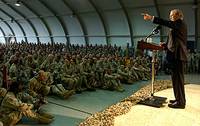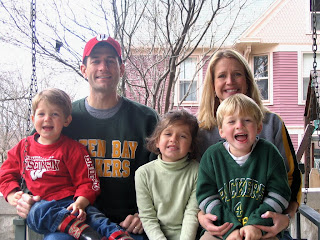USUN PRESS RELEASE # 271 (04) December 3, 2004 FOR IMMEDIATE RELEASE
Remarks by Ambassador John C. Danforth, U.S. Representative to the United Nations, on his Tenure as the U.S. Permanent Representative to the United Nations, at the Security Council Stakeout, December 3, 2004
Reporter: Any surprises for us today?
Ambassador Danforth: What can I say?
Reporter: Ambassador, why are you leaving?
Ambassador Danforth: I want to go home. It’s just that simple. It doesn’t have anything to do with making any kind of statement other than at this point in my life the question that I ask myself is what’s most important to me. And what is most important to me is my wife and my home and having more time with both. I’m a St. Louis guy and that’s the place I love and the wife of 47 years, and I just want to spend more time with both.
Reporter: Do you think Kofi should leave too?
Ambassador Danforth: I think that an investigation is going on. It’s very important when an investigation is going on to have it proceed in an orderly way and in a very thorough way, and for everybody to keep his mind open.
Reporter: Last week in some very strong words you expressed frustration with the General Assembly with the no action vote on Sudan. In general, what has been your feeling about the workings of the UN and your frustrations? And also, you said you would say something substantive about now on the report that came out? If you could address those two.
Ambassador Danforth: Anything else? In general, let me say that it has been an honor to have been here and to be in this position. The United Nations is very important. The U.S. is committed to a multilateral foreign policy and the United Nations is a key part of that. President Bush made that clear to me when he asked me to do this job; that is the position of our government. I have had a good experience here. I must say that in connection with the inaction of the General Assembly on the issue of Sudan, I just couldn’t understand it. I thought it was just plain wrong to say we can’t be bothered with the suffering of the people of Darfur or the people of Sudan. I am concerned that the General Assembly is essentially a place where 191 countries make statements and some of the statements they make are not very helpful in solving the problems of the world. With respect to the Security Council, I think we did very good work on our trip to Nairobi. To me the highest and best use of the Security Council is to provide a stage for the focus on significant issues and that’s what we did. My own view is that more important than the specific wording of a resolution is the focus we can give particular problems, and I think we’ve done that with respect to Sudan, and did it especially on the trip to Nairobi.
Reporter: Would you have stayed with this administration if you were offered a different post within the administration? And beyond that, how concerned are you now about the relations between the United Nations and the U.S.?
Ambassador Danforth: Well, first of all and I’ve thought a lot about this since September, since about Labor Day, if the President were to win, what would be my – what would I want to do and I talked a lot to my wife about it and thought a lot about it and what I really want to do is go home. I mean it’s really just as simple as that. And I wanted to make that clear. In fact, three days after the election I talked to the President’s Chief of Staff Andy Card and told him that what we want to do – what my wife and I want to do - is to go home. It’s not that we don’t like it here – we do. But it’s just home at this point in our lives and being together at this point in our lives, and not being off on some other pursuit. So that was my sole thought on that.
Reporter: How concerned are you about the relations between the United Nations and the U.S.?
Ambassador Danforth: I think, you know just my own experience, that being here and my own experience working in the Security Council and my experience with the UN is that essentially we have a good relationship and the rest of the world. We, of course, and I in this position have to do our best to state what is the policy of the United States, what’s our government’s say, and we do that to the best of our ability. But I’ve noticed a good relationship; I haven’t noticed anything other than that.
Reporter: You told the students of Washington University not too long ago (inaudible) that they have to check every word (inaudible)?
Ambassador Danforth: It’s different. Frustration is not exactly a word that applies to me. I’m not easily frustrated. Are you frustrated with this or that? I’m really not frustrated – it’s a different kind of role. My view is that it’s best that the U.S. have one foreign policy, not a bunch of independent operators. I do not believe that the Permanent Representative to the United Nations is an independent foreign policy maker or should be some sort of figure running around Washington saying exotic things, or running around New York saying exotic things. I really don’t believe that. I believe we should speak with one voice. And therefore I think that this particular method of operation is right. It’s the way I should function. It’s the way the State Department should function. It’s the way the government should function as a totality. Am I used to this kind of operating? No, I mean when I was in the U.S. Senate, I voted my conscience, my point of view and my position on issues, what I thought. And then when I’d go back to my home state and try my best to explain my position to my constituents. You can’t do that in this position, nobody can. I mean everybody who represents the government here does so as an ambassador. You’re representing a point of view that’s the point of view of the entire government, not just the point of view of an individual member of the United States Senate. So it’s a different kind of role, I think that the role here, I’m repeating myself, I think that the role here is not one for somebody who is an independent operator and shouldn’t be that way. And so that’s just the way it is.
Reporter: When you talked to Mr. Card, your name was already being mentioned as a possible replacement for Secretary of State Powell, in that conversation were you in effect ruling yourself out of consideration for that position? And as a second question, what do you see in your five months here as your greatest accomplishment?
Ambassador Danforth: The answer to the first question is yes. Now nobody in the White House talked to me about anything else, now this is three days after the election. And it certainly would have been presumptuous of me to call up the White House and say hey are you thinking about me for some other job. But did I want to sign on for a four-year stint at this time in my life, for something that would be preemptive of anything else in my life, and the answer to that question is no. So the message I gave is that I decided to go home from my current position, but obviously the message in that was that I just plain wanted to go home. Now I’m very happy, and I said this to the President in the letter I wrote him, if there’s something I can do in a more specific basis without being a government employee I’d be happy to do that, if I can do it from St. Louis as I did with Sudan and as I did with Waco before that in the Clinton administration. I’m very happy to do that kind of thing, but it’s the full-time job that I didn’t want to do. Now on the question of what is the most important thing. It was continuing to deal with Sudan; it was trying to increase the visibility of the issue of Sudan and particularly the trip to Nairobi.
Reporter: (inaudible)
Ambassador Danforth: I’m sorry?
Reporter: (inaudible)
Ambassador Danforth: The Syria-Lebanon Resolution, yes, it was.
Reporter: (inaudible) meeting with Kofi Annan?
Ambassador Danforth: It was not about anything we’ve talked about. It was about something that was much more nuts and bolts than we’ve talked about.
Reporter: (inaudible)
Ambassador Danforth: First of all, we welcome the report. It was a serious piece of work – is a serious piece of work. It recognizes the fact that the world situation is different now from when the UN was formed. It triggers a process now of considering what the UN should look like in the future. It makes about a hundred specific recommendations and all of that will require a lot of review and a lot of discussion among the members of the UN and within the governments of each country. We haven’t done that process of digesting it all, but we take this as very serious, as positive, as raising important issues, as starting an important process. And then let’s get into all of the details, and figure out whether the specific recommendations are just right or if they should be monitored in any way, what the precise answers should be. But it’s a very good start.
Reporter: (inaudible) I wanted to ask about the major priorities you set out in your initial testimony before congress. You said you wanted to expand and broaden the UN role in Iraq. How have you seen that progressing? Are you disappointed that you can’t get a more expansive approach to it?
Ambassador Danforth: Our approach has been to encourage the United Nations to be more and more active and present in Iraq and to follow up on the leading role that was set out in the resolution that was adopted last June. So you know it’s always been a matter of trying to encourage the UN to be more forthcoming, to encourage more people to be in Iraq to help out with the elections. I think there has been a very positive development in the last few days, and that was the Security Council creating the trust fund and the commitment of the European Union to $12 million dollars to provide the Middle Ring security for the UN people who are going to be in Iraq. So I think all of that’s positive and it’s moving in the right direction.
Reporter: (inaudible)
Ambassador Danforth: Do I believe it’s a moral place?
Reporter: (inaudible) is it a place where generally people act (inaudible)?
Ambassador Danforth: Yes, it’s a place of ambassadors. That is it’s a place of people who represent their governments. And therefore their job is to represent the national interests of 191 nations and they all have whatever their national interest are. So there’s a national interest component, it’s not the altruism society of the world, it’s a representation of national interests. But I’ve been very impressed at the convergence of the national interests, not to say that there aren’t real differences and differences on fine points. But the earnestness of the approach that my colleagues have taken, the desire to do the right thing, the commitment to making the world a better place is very real. There can be differences between the countries with respect to wording of resolution and specific points of emphasis, but the seriousness of purpose and the desire to do the right thing to make the world better and safer, I think it’s there and it’s very, very commendable.
Reporter: Ambassador, in your meeting with the Secretary General, did you offer words of support in this time of crisis for him?
Ambassador Danforth: The meeting was really about different matters than matters of crisis. It had to do with more specific nuts and bolts things rather than the problem you’re talking about.
Reporter: Ambassador, you’ve been here for a few months, what has experience taught you – what would you say is the number one reform that’s necessary for the United Nations?
Ambassador Danforth: I’m an ambassador not a personal recommender, so I think what we have to do is to take this report very seriously, study it very carefully, look to the future and what the real problems are today as opposed to what they were 50 years ago – 50 plus years ago and do a very good job trying to respond to the impetus this sort of report has given to that sort of analysis.
Reporter: Is there one area that needs reform that needs work?
Ambassador Danforth: Well, there are, I think, a hundred different suggestions in the report so we’ll look at all of them. Thanks a lot.
Reporter: (inaudible)
Ambassador Danforth: To do what?
Reporter: (inaudible)
Ambassador Danforth: I don’t – I really don’t agree with the premise of that comment. It’s very serious; charges have been made relating to the oil-for-food program, so they have to be taken seriously. And I – one thing I know about is investigations because I did the Waco investigation. When you go into an investigation there are at least two points you have to bear in mind, first of all, keep your mind open, don’t prejudge it. Don’t prejudge it on the basis that this person did something wrong. Don’t prejudge it to say all this is beyond reproach.
Reporter: (inaudible)
Ambassador Danforth: Just a second – wait, wait, wait, wait. Do you want me to respond to your question or would you like the mike?
Reporter: I’d just like to explain my question, sir. (inaudible)?
Ambassador Danforth: I’m saying that it’s important to have an investigation that goes forward. And it’s important that the investigation be one that is thorough, that is comprehensive and that is objective. And the only way that I know to conduct an objective investigation is to keep your mind clear of preconceived ideas.
Reporter: So you have confidence in Kofi Annan’s (inaudible)?
Ambassador Danforth: I’ve given you the answer to the question. No, you are not listening to me. You are not listening. What I am saying is that in the context of this oil-for-food controversy, it is important to have a thorough investigation and it is important that the investigators and the rest of us who are interested in the success of the investigation go into this with an open mind. And that means neither prejudging this on the side of innocence or the side of guilt, just open-mindedness. Thanks. ###
















